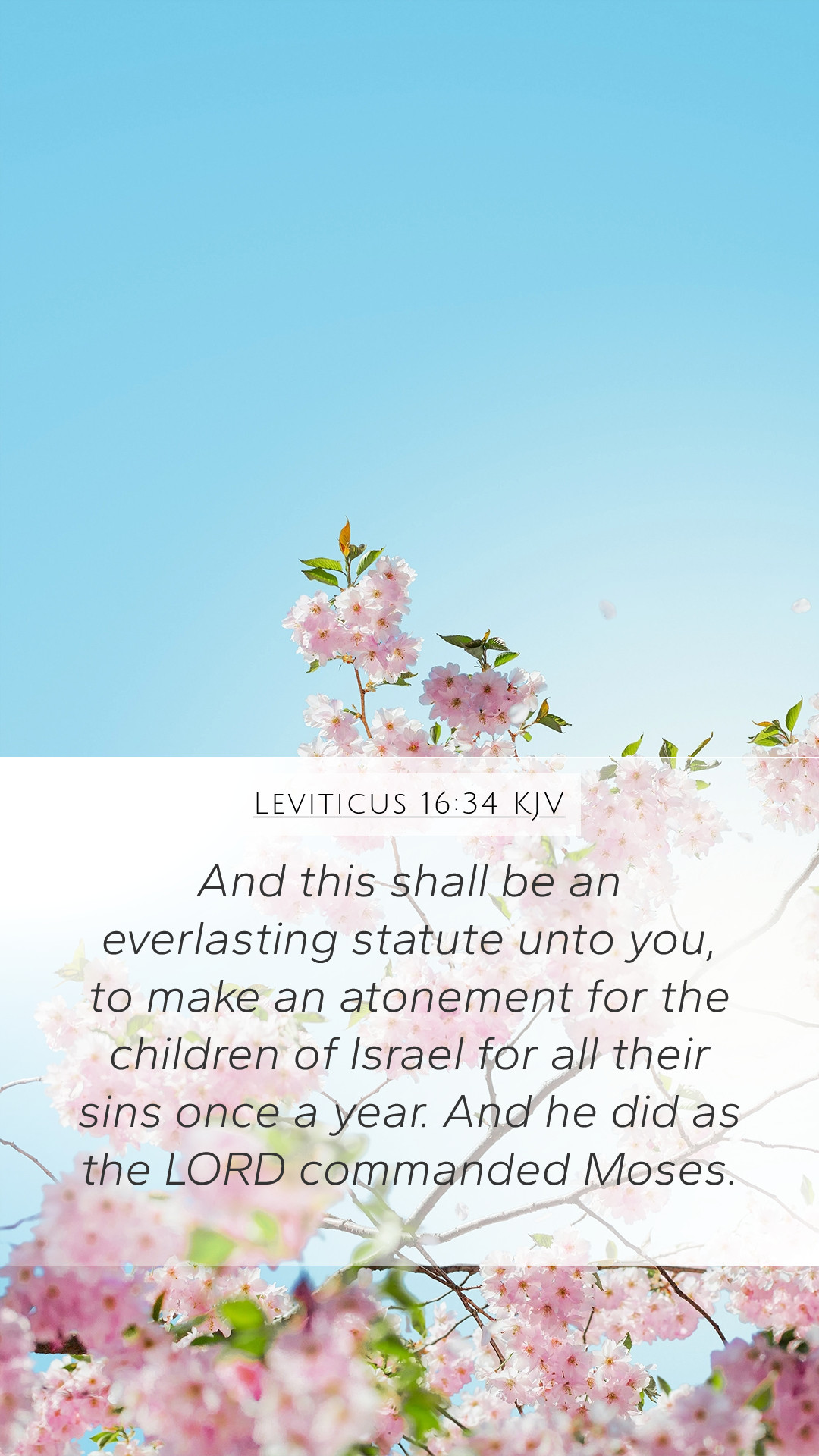Bible Verse Meaning and Commentary on Leviticus 16:34
Leviticus 16:34 states: "And this shall be an everlasting statute for you, to make atonement for the children of Israel for all their sins once a year." This verse is significant as it encapsulates crucial elements of the sacrificial system established in the Old Testament, particularly focusing on the Day of Atonement.
Overview of Leviticus 16:34
The context of this verse gives insight into the sacrificial rituals intended to cleanse the people of Israel from sin, establishing a yearly practice to maintain their covenant relationship with God. The verse emphasizes atonement, an essential concept indicating the reconciliation between God and His people.
Detailed Bible Verse Interpretations
-
Matthew Henry's Commentary:
Matthew Henry notes that this verse signifies the importance of continuous atonement for sin. He explains that the sacrificial system was not simply a ritual but a serious acknowledgment of sin's reality and its consequences. Henry emphasizes that the yearly atonement highlights God's mercy and justice, allowing for a renewal of the covenant relationship.
-
Albert Barnes' Notes:
Barnes points out the significance of the timing of atonement occurring once a year, reflecting the depth of sin and the continual need for purification. The 'everlasting statute' indicates the enduring nature of God's laws and the necessity for Israel to adhere to these practices to receive forgiveness and maintain their standing before Him.
-
Adam Clarke's Commentary:
Clarke contributes to the understanding by elaborating on the idea of atonement and its implications for the community. He discusses how these rituals point forward to the ultimate sacrifice of Christ, who fulfills the need for continuous atonement by offering Himself once and for all. Clarke’s analysis strengthens the connection between the Old Testament practices and New Testament fulfillment.
Understanding the Concept of Atonement
The concept of atonement (Hebrew: kippur) is pivotal in understanding Israel’s relationship with God. It denotes a covering or reconciliation made for sin, illustrating the burden of sin that weighs heavily on the people and the divine provision for forgiveness.
Biblical Exegesis
This verse can be analyzed through various lenses, including its historical, cultural, and spiritual context.
- Historical Context: Atonement practices were integral to ancient Israelite culture, where rituals performed by the High Priest were seen as critical for maintaining their covenant with God.
- Cultural Resonance: The people of Israel would have understood the significance of sacrifice, knowing it was a way to express devotion and seek reconciliation amidst their communal and individual transgressions.
- Spiritual Implications: This verse foreshadows the deeper spiritual truth fulfilled in Christ, illustrating the need for a Savior who addresses sin not just annually but eternally.
Applications of Leviticus 16:34 to Daily Life
Understanding the meaning of this Bible verse can encourage believers to reflect on their own lives and their need for forgiveness and atonement:
- Reflection on Personal Sin: Believers are encouraged to examine their actions and attitudes, recognizing the continual need for God’s grace.
- Emphasis on Repentance: Just as Israel participated in yearly atonement, modern believers are called to a lifestyle of repentance and reliance on Christ's sacrifice.
- Community Responsibility: Acknowledging the collective nature of sin, believers should support one another in seeking forgiveness and restoration within the community of faith.
Related Scripture Cross References
This verse relates to several other significant scripture references that deepen the understanding of atonement:
- Hebrews 9:7: Discusses the yearly blood of sacrifices and highlights the role of the High Priest.
- Romans 3:25: Portrays Christ as a sacrifice of atonement, drawing connections to Old Testament practices.
- 2 Corinthians 5:21: Emphasizes that Christ became sin for us, linking His atoning sacrifice with the needs expressed in Leviticus.
Conclusion
In summary, Leviticus 16:34 serves as a profound reminder of God's holiness and grace, illustrating the necessity of atonement throughout biblical history. The insights from public domain commentaries enrich our understanding and encourage deeper exploration into the richness of scripture.


